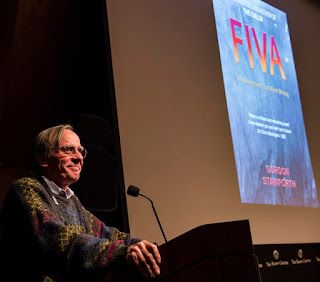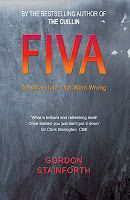This is the first of a series of interviews with authors, photographers, film-makers, and other creative people who all have one thing in common: a connection with mountaineering culture.
Tonight’s interview is with Gordon Stainforth, award-winning author of FIVA: An Adventure That Went Wrong which won the Best Book of Mountain and Wilderness Literature at the Banff Mountain Book Festival in 2012. FIVA is a true story of mountain disaster set in Norway, 1969, and is a direct account of the author’s own harrowing experience as a young man. Read my review of this excellent book here.
Gordon has also written four highly acclaimed mountain landscape books and has worked extensively in the film industry.
Please introduce yourself. Who are you and what do you do?
I am now a full-time writer (which also means doing a lot of promotional work, presentations, and research, outside of any actual writing.) I am no longer doing any professional photographic work, though I still do some book design and Photoshop work. In the little spare time I get I do a lot of reading, hillwalking and talking … and visit the occasional pub … I stopped rock climbing in 2007.
What inspired you to start writing?
I have been writing ever since the age of eight, when my twin brother and I started writing our first adventure stories – we actually made them into little books, which I still have – based almost entirely on Biggles 🙂 Of course a lot of academic writing followed at school and university, but once I was at film school I was struggling with creative writing again. I wrote a science fiction novel in 1986-87 after I left the film industry, and this has been revised about once a decade ever since … at last I have a publisher (it’s going to start as an ebook), and needless to say with the amount of work put into it it’s about ten times better than my original version. I have exactly six other book projects at the moment that I would love to do, three already in quite an advanced stage of preparation.
Your true story of mountain disaster, FIVA, has been widely acclaimed. I was impressed by the immediacy and honesty of the writing. How did you achieve this?
How I succeeded with Fiva was really by waiting so long before attempting to write it. I don’t think I could have done it nearly as well even a decade ago because I have learned so much over the years about writing, particularly dramatic writing. (In 2003 I wrote a screenplay on the highwayman Turpin, and although it never got made as a film, I probably learned more about story telling from that than anything I’ve ever done. I had lots of screenplay and film treatment failures in my 20s.) The key to all writing is to find the right voice, style and tone for the particular story. Actually, that applies to non-fiction too. Every book needs its entirely unique tone, in my view – and until you’ve got that right, you’re just wasting your time putting pen to paper (fingers to keyboard). Once I’d found the right tone for Fiva, it went really smoothly.
You have been writing about mountains and mountaineering for many years. Which of your books gave you the most pleasure to write?
Fiva by far. The other books involved a huge amount of very hard physical work with the photography, and were very satisfying in a completely different way, particularly Eyes to the Hills and The Cuillin. In the film industry I got a huge amount of satisfaction from editing and laying the music tracks for Kubrick’s The Shining. A lot of the choices of music were mine.
How important is photography to your work?
Photography is not important at all to me now. I am very satisfied with the books i’ve done, but it’s desperately hard, time-consuming work, and I am much more interested purely in ideas and words now. But I still think very much as a film maker, and am having a great time working with an artist who’s doing the illustrations for my forthcoming sci-fi novel. I am able to sketch my ideas out for her quite effectively. A bit like storyboarding for a movie. I love it.
Describe your most memorable or enjoyable mountain day.
I had so many memorable mountain days. Of course those three days on the Fiva Route in 1969 were certainly the most intense, but I had many others in the Alps (including two other epics on Piz Palu and the Aiguille du Peigne with John Syrett) and the Cuillin. And the first days of rock climbing in Snowdonia from 1968-70 are full of rich memories. Some of this will be in my autobiography …
What advice would you give to new writers?
Read and read and read; and think and write, think and write, think and write. Always think a lot first, before you put pen to paper. (I like to work to a pre-planned structure, i.e work out the shape or story first … it can always change.) Then let it flow as fast as possible – rhythm and euphony is so important. Leave all polishing to later. Then stand back from it, then edit it, stand back from it, then edit, stand back from it, then edit. Overall be intensely self-critical, never satisfied with second best, and never give up. There is so much truth in that old adage of one per cent inspiration and ninety-nine per cent perspiration. A lot of that perspiration will be preparation.
What are you working on at the moment?
Sci-fi novel, in very final stages. Then I have a biography of my great uncle (who broke the world speed record) to write. That’s an amazing story, because of the way his private life – which very few people know about – became entangled with his flying career and ultimately led to his destruction. It really is a fantastic story.
Who has influenced you the most?
I was very fortunate to work with and talk to some of the greatest creative people in the film industry, such as Stanley Kubrick, Ridley Scott, and Ronald Harwood – but Kubrick was by far my greatest influence. We got on very well, because we actually had the same kind of very focused way of working, and I think similar interests.
Tell us how we can find out more about your work.
Everything about my work can be found on my website,
www.gordonstainforth.co.uk – though I’m being completely tight-lipped about my sci-fi book, because it’s going out under a pseudonym.
Many thanks to Gordon Stainforth for the interview!





